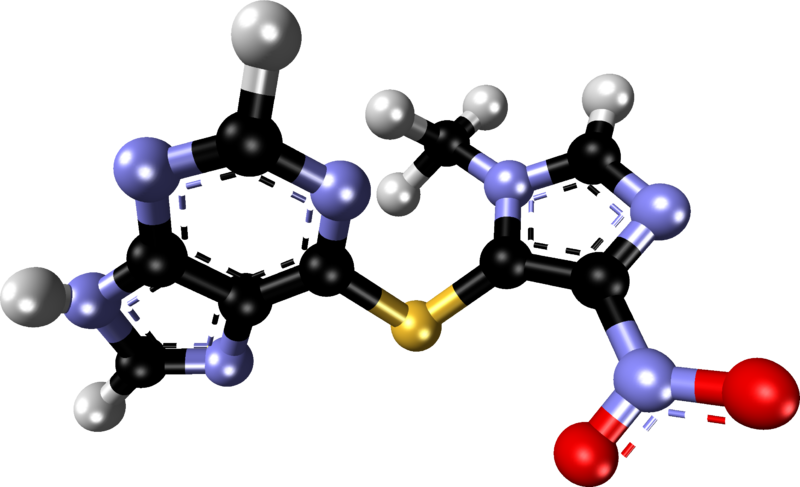
Strand B: Clinical Translational Research
Clinical Programme 2 - Early Phase Trials
Clinical Trial B: Azathioprine immunosuppression and disease modification in Parkinson’s disease (AZA-PD).
Lead/Co-lead: Dr Caroline H. Williams-Gray/Professor Roger A. Barker
Aim
Immune activation is strongly implicated in a number of neurodegenerative diseases, including Parkinson’s disease (PD) and related Parkinson-Plus disorders. Our own work has demonstrated not only that there is a genetic link between the immune system and PD risk, but also a more active immune response with raised inflammatory markers in the blood being associated with more rapid progression of the disease. This study will test the hypothesis that suppressing the peripheral immune response in PD with azathioprine is an effective disease-modifying strategy. This may ultimately lead to the clinical adoption of a highly cost effective therapy to delay disability and prevent progression to the some of the most feared complications of PD including severe balance problems and dementia, for which we currently have no effective treatments. This therapeutic strategy may also be beneficial for other Parkinson–Plus disorders which share common disease mechanisms.
Methods
- We will perform a double-blind randomised controlled trial of azathioprine versus placebo in a cohort of early PD patients at high risk of rapid disease progression to provide proof of concept for immunosuppression as a disease-modifying strategy.
- We will evaluate the effect of azathioprine on markers of immune activation in blood and CSF and on PET neuroimaging to provide proof of mechanism.
Related publications
-
Greenland JC, Cutting E, Kadyan S, Bond S, Chhabra A, Williams-Gray CH.Azathioprine immunosuppression and disease modification in Parkinson'sdisease (AZA-PD): a randomised double-blind placebo-controlled phase IItrial protocol. BMJ open. 2020;10(11):e040527.
-
Kouli A, Camacho M, Allinson K, Williams-Gray CH. Neuroinflammation andprotein pathology in Parkinson’s disease dementia. Acta neuropathologicacommunications. 2020;8(1):211.
-
Wijeyekoon RS, Kronenberg-Versteeg D, Scott KM, Hayat S, Kuan WL, EvansJR, Breen DP, Cummins G, Jones JL, Clatworthy MR, Andres Floto R, BarkerRA, Williams-Gray CH. Peripheral innate immune and bacterial signalsrelate to clinical heterogeneity in Parkinson’s disease. Brain,behavior, and immunity. 2020; doi.org/10.1016/j.bbi.2020.01.018
-
Martin-Ruiz C, Williams-Gray CH, Yarnall AJ, Boucher JJ, Lawson RA,Wijeyekoon RS, Barker RA, Kolenda C, Parker C, Burn DJ, Von Zglinicki T,Saretzki G. Senescence and Inflammatory Markers for Predicting ClinicalProgression in Parkinson’s Disease: The ICICLE-PD Study. Journal ofParkinson’s disease. 2020;10(1):193-206.
-
Wijeyekoon RS, Moore SF, Farrell K, Breen DP, Barker RA, Williams-GrayCH. Cerebrospinal Fluid Cytokines and Neurodegeneration‐AssociatedProteins in Parkinson’s Disease. Movement disorders 2020;35(6):1062-6.
-
White AJ, Wijeyekoon RS, Scott KM, Gunawardana NP, Hayat S, Solim IH,McMahon HT, Barker RA, Williams-Gray CH. The Peripheral InflammatoryResponse to Alpha-Synuclein and Endotoxin in Parkinson’s Disease.Frontiers in neurology. 2018;9:946.
-
Wijeyekoon RS, Kronenberg-Versteeg D, Scott KM, Hayat S, Jones JL,Clatworthy MR, Floto RA, Barker RA, Williams-Gray CH. Monocyte Functionin Parkinson’s Disease and the Impact of Autologous Serum onPhagocytosis. Frontiers in neurology. 2018;9(870).
-
Williams-Gray CH, Wijeyekoon RS, Scott KM, Hayat S, Barker RA, Jones JL.Abnormalities of age-related T cell senescence in Parkinson’s disease.Journal of neuroinflammation. 2018 May 28;15(1):166.
-
Williams-Gray CH, Wijeyekoon R, Yarnall AJ, Lawson RA, Breen DP, EvansJR, Cummins GA, Duncan GW, Khoo TK, Burn DJ, Barker RA, ICICLE-PD Studygroup. Serum immune markers and disease progression in an incidentParkinson’s disease cohort (ICICLE-PD). Movement disorders 2016 Mar21;31(7):995-1003.


